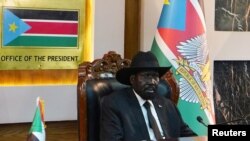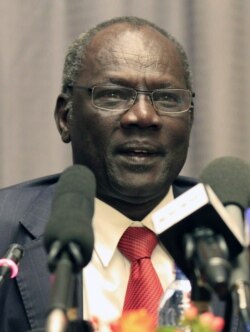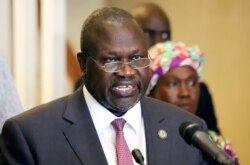Parties to South Sudan’s revitalized peace deal missed a regional deadline Sunday to dissolve and reconstitute parliament.
A July 14 communiqué by East African bloc IGAD (Inter-Governmental Authority on Development), which mediated South Sudan’s peace agreement, called on President Salva Kiir to dissolve the current National Legislative Assembly by July 26.
A partial unity government was formed five months ago, but parliament has yet to be reconstituted and Kiir appointed state governors just a few weeks ago.
Information Minister Michael Makuei told VOA’s South Sudan In Focus that the parties are still working on “the process” of reconstituting parliament.
There is no good reason for the delay, according to Boboya James, a policy analyst and researcher with the Institute of Social Policy and Research in Juba.
“The more you delay, the more you make the people of South Sudan suffer. It is important for the formation to happen so that the structures of government under the peace agreement are able to function,” James told South Sudan in Focus.
The parties are well aware of the IGAD deadline but waited for the new governors to assume their posts before appointing new party representatives in the National Legislative Assembly, according to Josephine Lagu, chairperson of the South Sudan Opposition Alliance.
“Most parties were waiting for the appointment of the state governors, and obviously you know discussions about allocation of positions at the state levels, so that parties are clear who are some of the candidates now that will be eligible to join the transitional national legislative assembly,” Lagu told VOA.
The parties are still negotiating how to allocate ministerial portfolios at the state level, Lagu said.
Repeated calls to First Vice President Riek Machar spokesperson James Gatdet and the SPLM-IO’s Peter Manoah for comment were unsuccessful as neither SPLM-IO official answered their phone.
The peace deal requires that the current 400-member parliament be dissolved and reconstituted to include the full 550 members of the unity government, including nearly 40% representation from parties other than Kiir’s ruling SPLM party.
The deal allocates 332 parliamentary slots to the ruling SPLM, 128 to Machar’s SPLM-IO, 50 to the South Sudan Opposition Alliance, 30 to the umbrella opposition group referred to as “Other Political Parties,” and 10 members to the Former Detainees.
In the interest of transparency, the parties should explain to the South Sudanese people why the new parliament has not been formed, James said.
“It is also important for the government to come out to Upper Nile [state] and tell them why certain things are not happening. You know we were very happy when Salva Kiir came out and said ‘no, the reason as to why I am unable to appoint the governor of Upper Nile is because of a, b, c, d.’ That provided relief to the public because you know there was a lot of speculation and speculation creates a lot of anxiety within the public arena, so it is important for that to happen,” James told VOA.









